//users/2694949b-df5a-42f8-bc78-13187d2b392a/ratecard/esrc.jpg)
%2Ffit-in%2F300x300%2Fusers%2F2694949b-df5a-42f8-bc78-13187d2b392a%2Fratecard%2Fesrc.jpg&w=256&q=75)
%2F300x300%2Fusers%2F2694949b-df5a-42f8-bc78-13187d2b392a%2Fimages%2Fpicturesque-cape-charles-getaway-2643.jpg&w=256&q=75)
%2F300x300%2Fusers%2F2694949b-df5a-42f8-bc78-13187d2b392a%2Fimages%2Fmassive-cobia-catch-cape-charles-2692.jpg&w=256&q=75)
%2F300x300%2Fusers%2F2694949b-df5a-42f8-bc78-13187d2b392a%2Fimages%2Ffishing-adventure-cape-charles-2673.jpg&w=256&q=75)
%2F300x300%2Fusers%2F2694949b-df5a-42f8-bc78-13187d2b392a%2Fimages%2Fangler-fishing-va-2623.jpg&w=256&q=75)
%2F300x300%2Fusers%2F2694949b-df5a-42f8-bc78-13187d2b392a%2Fimages%2Fcobia-fishing-cape-charles-2510.jpg&w=256&q=75)
%2F300x300%2Fusers%2F2694949b-df5a-42f8-bc78-13187d2b392a%2Fimages%2Ffishing-adventure-virginia-2648.jpg&w=256&q=75)
%2F300x300%2Fusers%2F2694949b-df5a-42f8-bc78-13187d2b392a%2Fimages%2Famerican-eel-cape-charles-fishing-2666.jpg&w=256&q=75)
%2F300x300%2Fusers%2F2694949b-df5a-42f8-bc78-13187d2b392a%2Fimages%2Fcobia-cape-charles-fishing-2591.jpg&w=256&q=75)
%2F300x300%2Fusers%2F2694949b-df5a-42f8-bc78-13187d2b392a%2Fimages%2Ffishing-cape-charles-2709.jpg&w=256&q=75)
%2F300x300%2Fusers%2F2694949b-df5a-42f8-bc78-13187d2b392a%2Fimages%2Fscenic-virginia-landscape-2674.jpg&w=256&q=75)
Top-Rated Cape Charles Inshore Fishing Charters
What you will be catching:
 Black Drum
Black Drum Black Sea Bass
Black Sea Bass Bluefish
Bluefish Cobia
Cobia Redfish
Redfish Spadefish
Spadefish Spanish Mackerel
Spanish Mackerel Striped Bass
Striped Bass
Trip Pricing and Availabilities :
No trip pricing information available at this time.
Reel in the Action: Cape Charles VA Fishing
Hey there, anglers! Ready to wet a line in some of the best inshore waters the Chesapeake Bay has to offer? Our 4-hour trip out of Cape Charles is just the ticket. We're talking about prime fishing grounds where the stripers play and the redfish roam. No need to fuss with gear – we've got you covered. Just bring your favorite snacks, maybe a cold drink or two, and we'll handle the rest. It's time to earn those stripes on the water!
What to Expect on the Water
Picture this: You're cruising out of Cape Charles, the Eastern Shore stretching behind you as we hit the sweet spots of the lower Chesapeake. Our 4-hour inshore trip is perfect for both newbies and seasoned anglers looking to squeeze in some quality fishing time. We'll be targeting a mix of fish – from hard-pulling stripers to tasty black sea bass. The Bay's always got something biting, and we know just where to find 'em. Our boat's set up for six, so bring your buddies or the family for a day of rod-bending action.
Fishing Tactics & Hotspots
Alright, let's talk strategy. Depending on what's running, we might be drifting live bait for cobia, jigging for stripers around structure, or sight-casting to schools of redfish. We've got light tackle setups that'll give you a real thrill when a big one hits. The waters around Cape Charles are a patchwork of oyster beds, channel edges, and grass flats – each spot holding different species. We'll hit a variety of these honey holes to maximize your chances of a cooler full of fish. And don't worry if you're new to this – we'll show you the ropes and have you casting like a pro in no time.
Top Catches This Season
Folks have been crushing it out here lately. Just last week, we had a group nail their limit of black drum – those things fight like freight trains! Another crew managed to boat a monster 50-pound cobia that had everyone's jaws dropping. The spadefish have been thick around some of the local wrecks, providing non-stop action and some tasty fillets to take home. Whether you're after a trophy photo or some fresh fish for dinner, the Bay's been delivering in spades.
Species You'll Want to Hook
Striped Bass: The rockfish, as we call 'em around here, are the kings of the Chesapeake. These bruisers can top 40 pounds and put up a fight that'll have your arms aching. Spring and fall are prime time, but we catch 'em year-round. There's nothing like the thrill of a big striper crushing a topwater lure at dawn. Redfish: Also known as red drum, these copper-colored beauties are a blast on light tackle. They love to cruise the shallows, and sight-casting to a tailing red is about as exciting as it gets. Fall is fantastic for big bulls, but we catch 'em all summer long. Black Sea Bass: Don't let their size fool you – these strukture-loving fish pull hard and taste even better. We target them around wrecks and reefs, and they're almost always eager to bite. They're great eating, so be ready to take some home for the grill. Cobia: The "man in the brown suit" is a summer favorite. These powerful fish can top 100 pounds and often travel in schools near the surface. Sight-casting to cobia is a rush, and hooking one is like being tied to a freight train. Spadefish: These odd-looking fish might not win any beauty contests, but they're a blast to catch. They school up around structure and put up a scrappy fight on light tackle. Plus, they're excellent table fare. Spanish Mackerel: Fast and furious, Spanish macks will test your reflexes. We troll for these speedsters, and when a school is around, the action can be non-stop. They're also delicious smoked or grilled fresh. Bluefish: The Bay's bullies, blues are all attitude. They hit hard and fight dirty, often putting on aerial displays. When the blues are running, be ready for some serious rod-bending action. Black Drum: The bigger cousins of the reds, black drum can reach impressive sizes. They love crustaceans, so we often target them with crab baits. Landing a big black drum is a real accomplishment – they pull like no other.
Time to Book Your Spot
Look, the fish are out there waiting, and we've got the know-how to put you on 'em. Our 4-hour trip is the perfect slice of Chesapeake Bay fishing – long enough to get into some serious action, but short enough to fit into your vacation schedule. Whether you're looking to bend a rod, fill the cooler, or just soak in the beauty of the Eastern Shore, we've got you covered. The boat's gassed up, the bait's fresh, and the fish are biting. All we need is you. So what do you say? Ready to earn those stripes on the water? Give us a shout and let's get your Cape Charles fishing adventure locked in. Trust me, your only regret will be not doing it sooner. See you on the water!
Learn more about the species
Black Drum
Black drum are hard-fighting bottom feeders that can grow huge. While most run 5-30 pounds, 50+ pounders turn up every year. Look for them around oyster beds, bridge pilings and channel edges. Spring is prime time as they move into the bay to spawn. Drum put up a stubborn, head-shaking fight and smaller ones are good eating. To land a big one, use fresh clams or blue crab for bait. A local trick is to fish the last of the incoming tide when they're actively feeding before high water. Whether you're after trophy fish or just want steady action, black drum offer both. Just be ready for some heavy lifting when you hook into a big one.

Black Sea Bass
Black sea bass are a tasty bottom-dwelling species you can catch year-round here. Most run 1-3 pounds, but 5+ pounders aren't uncommon. Look for them around structure like wrecks, reefs and rocky bottoms in 30-120 feet of water. They bite best in spring and fall as water temps change. Sea bass fight hard for their size and are excellent eating. To catch more, use a dropper rig with squid or cut bait. A local tip is to move frequently - when you find a school, you can catch them fast until they wise up. Sea bass are fun for the whole family and fill a cooler quickly when you find them. Just watch out for their sharp spines when unhooking.

Bluefish
Bluefish are aggressive fighters that'll attack just about anything. These toothy predators average 2-5 pounds but can reach 20+. Look for them busting bait on the surface, often in open water. Peak season is summer and fall as they chase bait schools. Blues fight dirty, chomping lines and thrashing at the boat. Smaller ones are good eating when prepared right. To catch more, cast metal lures into feeding frenzies or troll surgical tube lures. A local tip is to always use a wire leader - their razor-sharp teeth will slice through mono. Bluefish offer fast, furious action and are a great species for introducing kids to saltwater fishing.

Cobia
Cobia are hard-fighting bruisers that migrate through in summer. These "brown bombers" average 20-40 pounds but 60+ pounders aren't rare. Look for them around buoys, channel markers and floating debris. Peak season is June-August as they follow bait schools up the coast. Cobia put up an epic battle, making long runs and often jumping. They're also excellent eating. To land a big one, slow-troll live eels or sight-cast big bucktails. A local tip is to watch for rays - cobia often follow them looking for an easy meal. Whether you're after a trophy fish or just want an arm-wrenching fight, cobia deliver serious thrills.

Redfish
Redfish are a blast to catch in the shallows around Cape Charles. These bronze beauties usually run 5-10 pounds but can grow over 40. Look for their distinctive spot near the tail. You'll find them tailing in water as shallow as 1-2 feet, often right up against marsh grass or oyster beds. Fall is prime time as they school up to spawn. Reds put up a stubborn fight and are delicious on the table. To fool a big one, try sight-casting with a gold spoon or live shrimp under a popping cork. A local secret is to fish the first hour of the falling tide when they're actively feeding. Whether you're wading or in a boat, redfish offer exciting sight-fishing and pulls that'll test your gear.

Spadefish
Spadefish are unique-looking battlers that school up around structure. Most run 2-5 pounds but can reach 10+. Look for them near buoys, wrecks and pilings, often right at the surface. Summer is prime time when big schools move in. Spades fight hard for their size, making runs and going vertical. They're also good eating. To catch more, use small pieces of clam on a tiny hook. A local secret is to chum with bits of clam to keep a school fired up. Spadefish offer steady action for all skill levels and are a fun change of pace from other bay species. Just watch out for their sharp dorsal spines when handling them.

Spanish Mackerel
Spanish mackerel are fast-moving speedsters that blitz through in summer. These sleek fish average 2-4 pounds but can reach 10+. Look for them in open water, often giving away their location by jumping. Peak season is July-September as they chase bait schools up the coast. Spanish macks fight hard for their size, making blistering runs. They're also delicious eating. To catch more, troll small spoons or cast metal jigs into feeding frenzies. A local trick is to watch for diving birds - that usually means mackerel are pushing bait to the surface. Spanish offer fast action for all skill levels and are a summertime favorite for both sport and food.

Striped Bass
Striped bass are powerful fighters that'll give you a run for your money. These fish average 10-30 pounds but can grow over 50. Look for them near structure like reefs, jetties and bridge pilings. They love moving water, so target them during tidal changes. Spring and fall are prime seasons as they migrate. Stripers put up an epic battle and taste great on the grill. To land a big one, try live-lining bunker or eels. A local trick is to fish topwater plugs at dawn and dusk when they're feeding aggressively near the surface. Whether you're after trophy fish or just want some action, stripers deliver an awesome experience for anglers of all skill levels.

About the Hateras (Flybridge)
%2F%2Fusers%2F2694949b-df5a-42f8-bc78-13187d2b392a%2Fboat_picture%2F275781484_3139287716304828_2089746835297394061_n.jpg&w=1200&q=75)
Vehicle Guest Capacity: 6
Manufacturer Name: Catepillar
Maximum Cruising Speed: 25
Number of Engines: 2
Horsepower per Engine: 567
Get ready for an awesome day of fishing on the Chesapeake Bay with Earnin Stripes! Our 4-hour trips out of Cape Charles are perfect for reeling in some of the area's best catches. We'll be targeting species like cobia, bluefish, mackerel, black drum, and redfish. No need to worry about gear - we've got you covered with all the rods, reels, and tackle you'll need. Just bring along some snacks and drinks to keep you fueled up while we're out on the water. Whether you're an experienced angler or trying fishing for the first time, our crew will make sure you have a great time. The Chesapeake Bay is an amazing fishery, and we can't wait to share it with you. Book your trip with us and get ready for an awesome day of fishing!
%2Ffit-in%2F250x250%2Fguide_websites%2F5710%2Fimages%2Fearningstripessportfishing.png&w=1200&q=100)


%2Ffilters%3Aformat(webp)%2Fusers%2F2694949b-df5a-42f8-bc78-13187d2b392a%2Fimages%2Famerican-eel-cape-charles-fishing-2666.jpg&w=768&q=75)
%2Ffilters%3Aformat(webp)%2Fusers%2F2694949b-df5a-42f8-bc78-13187d2b392a%2Fimages%2Fcobia-cape-charles-fishing-2591.jpg&w=768&q=75)
%2Ffilters%3Aformat(webp)%2Fusers%2F2694949b-df5a-42f8-bc78-13187d2b392a%2Fimages%2Ffishing-cape-charles-2709.jpg&w=768&q=75)
%2Ffilters%3Aformat(webp)%2Fusers%2F2694949b-df5a-42f8-bc78-13187d2b392a%2Fimages%2Fscenic-virginia-landscape-2674.jpg&w=768&q=75)
%2Ffilters%3Aformat(webp)%2Fusers%2F2694949b-df5a-42f8-bc78-13187d2b392a%2Fimages%2Fpicturesque-cape-charles-getaway-2643.jpg&w=768&q=75)
%2Ffilters%3Aformat(webp)%2Fusers%2F2694949b-df5a-42f8-bc78-13187d2b392a%2Fimages%2Fmassive-cobia-catch-cape-charles-2692.jpg&w=768&q=75)
%2Ffilters%3Aformat(webp)%2Fusers%2F2694949b-df5a-42f8-bc78-13187d2b392a%2Fimages%2Ffishing-adventure-cape-charles-2673.jpg&w=768&q=75)
%2Ffilters%3Aformat(webp)%2Fusers%2F2694949b-df5a-42f8-bc78-13187d2b392a%2Fimages%2Fangler-fishing-va-2623.jpg&w=768&q=75)
%2Ffilters%3Aformat(webp)%2Fusers%2F2694949b-df5a-42f8-bc78-13187d2b392a%2Fimages%2Fcobia-fishing-cape-charles-2510.jpg&w=768&q=75)
%2Ffilters%3Aformat(webp)%2Fusers%2F2694949b-df5a-42f8-bc78-13187d2b392a%2Fimages%2Ffishing-adventure-virginia-2648.jpg&w=768&q=75)
